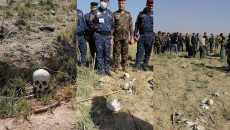The Iraqi Kurdistan Regional Government KRG is planning to register the Peshmerga went missing following ISIS attacks as martyrs while some of the families reject it arguing they either might be still alive or bodies to be found in mass graves unearthed yet.
Relatives of the missing and captured Peshmergas on June 7th met the secretary general of KRG ministry of Peshmerga Jabar Yawar in Erbil.
“They had some demands regarding salary and privileges of the families of the Pshmerga and we pledged to be helpful,” said Yawar.
Mid 2014, over 62 Peshemrgas went missing following the attacks by so-called Islamic State in Iraq and Syria ISIS which managed to control one third of Iraq up to 2017. 21 of the missing and capture Peshmergas are from Kirkuk.
Irfan Barzinji, representative of the families of the missing Peshmerga said the commanders asked their families to file applications in order to register them as martyrs.
“This is problematic as some of them reject it saying their sons are still alive and others are unwillingly agreed.”
The relatives of the missing and abducted Peshmergas, some of them seen in videos posted by Daesh, blame the KRG in Erbil and Baghdad for not meeting Daesh demands in order to free their sons.
They are still waiting for tens of mass graves to be unearthed in order to find the bodies of their beloved and put an end to their miseries since years.
The relatives of the Peshmerga brought to unknow destiny by Daesh relentlessly protested in front of headquarters of Kirkuk administration, the United Nations and KRG council of Ministers in Erbil yet no step taken forward.
Kirkuk 2015- Maktab Khalid area, where a number of Peshmerga went missing following an assault by the extremist militants of ISIS. Karwan Salihi
“We have visited the ministry of Peshmerga and they pledged to support us but our demands are a bit different. We have got information some of them are alive, rescued in the military operations against Daesh in Mosul and Hawija and jailed in Iraqi prisons,” Barzinji added.
Besides, a number of mass graves were discovered in Kirkuk and other areas. “We think a number of the captured Peshmergas are buried there and asked to exhume it.”
Members of the previous round of Iraqi parliament human rights committee particularly the Kurds have addressed Iraqi ministry of justice early 2018 to uncover destiny of the missing Peshmerga in the areas Daesh was ousted or in Iraqi prisons but no feedback obtained.
“There are no any updates about the missing Peshmerga,” Yawar affirmed.
The Iraq and Syrian government have declared their victory over ISIS and all areas they controlled were liberated.
Following a video by Daesh militants in 2015, a parade by the extremist militants showed a number o Peshmergas in iron cages at the back of Pick Ups downtown of Hawija, the families called on Baghdad and Erbil to meet ISIS demands in order to free their sons.
“Unfortunately, no one is supporting us. Daesh was ready in the beginning to free them yet Peshmerga senior commanders could not make a deal and up to day they do not listen to the demands by their relatives,” said Shakhawan Zahir, brother of Asso, one of the Peshmergas captured by Daesh.
Hawija, which lies 215km north Baghdad, has been a stronghold of Jihadist Sunni Arab insurgents since the US-led invasion of Iraq in 2003. The town fell to IS in June 2014, when the jihadist group seized control of much of northern and western Iraq and proclaimed the creation of a "Caliphate".
Locals told KirkukNow Arab tribe chieftains did their best to convince IS commanders to release the captured Peshmerga in order to prove their good will for the Kurdish forces.
Zahir managed to interview a commander of IS in Kirkuk prison whom told him several peshmergas were buried in Hawija mass graves and Bakara military base.
“He narrated in detail how the Peshmergas were martyred. Ten of them are buried in Bakar mass graves and four others in the yard of the house for Hawija’s judge.”
“We don’t want anything except helping us to unearth the mass graves and find the corpses of our relatives in order to put an end for our waiting,” Zahir sobbed.
The federal Iraqi government runs the issue of mass graves left by Daesh.
Baghdad has not declared official figures about death toll of the fight against Daesh while the KRG data shows that 1700 members of the Peshmerga and 1293 Civilian Ezidis were killed, and over 10,000 Peshmerga were injured.
6417 adherents of the Ezidi ethno-religious minority in Mosul were enslaved and half of them were freed up today yet 62 Peshemrga were captured by ISIS militants and still missing.
In December 2017, the Associated Press AP estimated that 9,000 to 11,000 civilians had died in urban fighting in Mosul that began on October 16, 2016, an estimate nearly 10 times higher than what had been officially reported.
At least a third of those deaths, the AP found, came as a result of coalition or Iraqi bombardments.
In a separate investigation, NPR reported that Mosul morgue had recorded the names of 4,865 individuals on death certificates, dating between October 2016 and July 2017, and estimated that more than 5,000 civilians had been killed.





